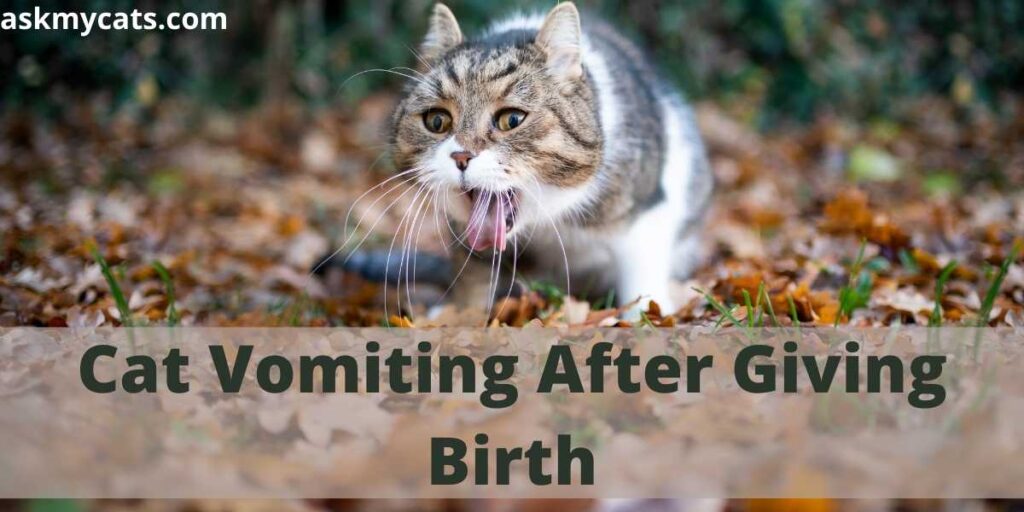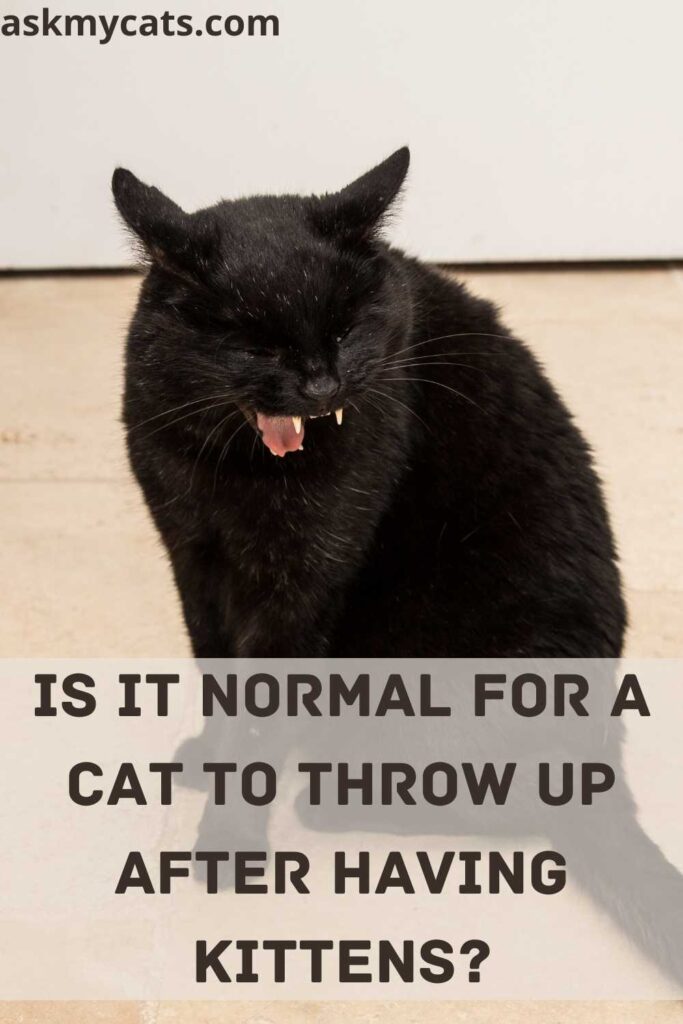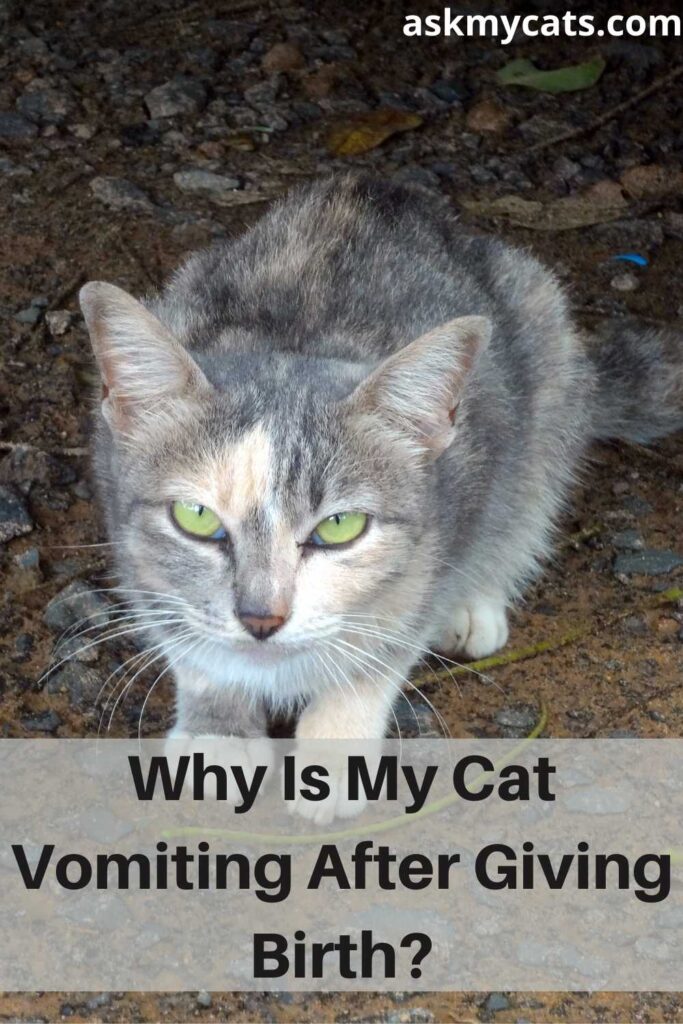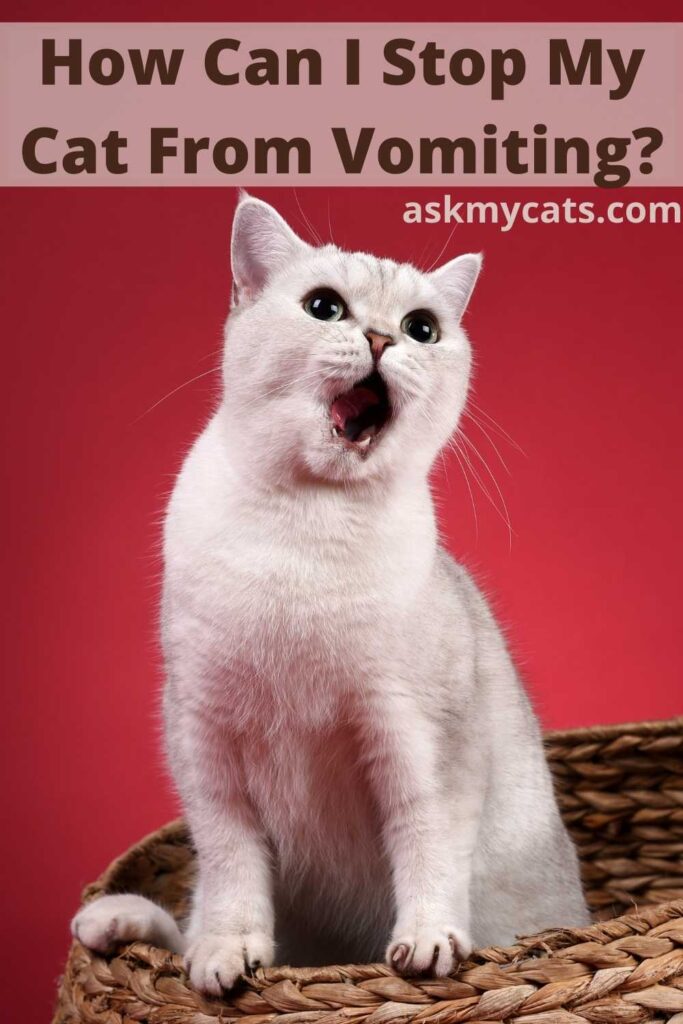Having kittens should be a joyous time for your cat, but when cats give birth, your cat will show some unusual indicators of having kittens.
You may want to pamper your cat, but she may reject your attempts since after giving birth, cats’ behavior tends to change. You must keep a look on your cat’s health, in order to keep them healthy.
So, do cats vomit after giving birth?
Yes, some cats vomit after giving birth.
Keep reading this article to know the reasons behind your cat’s vomiting after giving birth.


Give Your Cat the Perfect Day
Get the Free Ebook!
Is It Normal For A Cat To Throw Up After Having Kittens?
Yes, it is normal for a cat to throw up after having kittens.

When a cat gives birth, she must consume the feces and clean up after the kittens.
As a result, some cats will vomit and/or have diarrhea.
This was most likely the cause if the vomiting and diarrhea were not severe and she was otherwise in good health (eating, drinking, being active, and caring for the kittens).
If she isn’t caring for the kittens, or if she appears lethargic, uninterested in food or water, or if she is overheated, she should see a veterinarian.
Pregnancy and delivery can cause a lot of stress in animals, just like it does in people, and can lead to secondary infections by weakening the body’s immunity.
Low blood calcium levels in nursing mothers can lead to sickness, tiredness, decreased appetite, weakness, and tremors.
You should take her to your veterinarian. Bring the kittens with you (make sure the car is heated) because leaving them behind will give Mom considerable worry.
If your cat is 4-5 weeks pregnant, this is most likely morning sickness, which some cats experience for a week or two at this point of pregnancy.
Vomiting might also be caused by a shift in her typical diet. If your cat is approaching full term (about 63 days), you should take her to the veterinarian.
Vomiting is a common initial indicator of labor, although it should not persist more than 24 hours.
Continuous vomiting could be an indication of dystocia (birthing issues), in which the kitten is blocked in the birth canal while the cat is trying to give birth.
It could also be an indication of an infection that only a veterinarian can treat.
You should consult your veterinarian to see if she is suffering from a more serious ailment; but, there could be a simpler explanation, so don’t panic until you know for sure.
I’m not a veterinarian, but my own cat recently gave birth to four kittens, and during the first six weeks, she had been vomiting twice or three times a day.
We took her to the vet every time, but there was never a significant problem. Our doctor informed us that because nursing cats eat their babies’ feces, the flora in their intestines is continuously changing and adjusting, exactly as the flora in the kittens’ intestines when they are exposed to new diets.
Also, check out Cat Panting After Giving Birth: Know Possible Reasons
Why Is My Cat Vomiting After Giving Birth?
Here are some reasons why your cat is vomiting after giving birth: –

1. Metritis Or Endometritis
Metritis and endometritis are two kinds of uterus inflammation.
In cats, it normally occurs within three days of birth.
Queens will be significantly sicker than if the fetal membranes are retained.
Fever, complete disregard for her kittens, refusal of food, and lack of activity are all symptoms.
She might vomit and consume more water than normal as well.
A foul-smelling, deep red wine or black-colored discharge will be visible from her vaginal area.
She will require emergency veterinary care, which will involve a thorough examination, diagnostic tests, and supportive care, such as intravenous (IV) fluids, antibiotics, pain management, and other procedures.
Metritis is a uterine illness characterized by an inflammation of the endometrium (uterine lining) caused by a bacterial infection that usually occurs within a week of a cat’s birth.
It can also occur as a result of natural or medical abortion, miscarriage, or non-sterile artificial insemination.
Gram-negative bacteria, such as Escherichia coli, are the most common cause of uterine infection, and they frequently move into the bloodstream, resulting in a blood infection.
The infection can cause sterility and, if left untreated, septic shock, a life-threatening illness.
A complete medical exam will be performed by your veterinarian, which will include a chemical blood profile, a complete blood count, an electrolyte test, and a urinalysis.
These tests will help your veterinarian figure out if the bacterial illness has spread to the bloodstream, where the infection may have started, and how dehydrated your cat is.
You’ll need to provide a detailed history of your cat’s health, including the development of symptoms and any incidences that may have led up to this condition.
Your veterinarian can visually inspect the interior of the uterus using diagnostic methods like radiograph and ultrasound imaging to look for any retained babies or birth materials, excess fluid collection, and/or abnormal quantities of abdominal fluid production owing to uterine rupture.
A cytologic (microscopic) examination of the vaginal discharge will also be performed.
The bacterial populations present in the blood will be identified using a culture of both aerobic and anaerobic bacteria (bacteria that live with or without oxygen, respectively), and a sensitivity test of the isolated bacteria will be performed to determine the most appropriate antibiotic treatments.
2. Gastroenteritis
Gastroenteritis is a fancy term for a stomach ache that can be caused by a variety of factors, including dietary indiscretion, pollutants, or drug side effects, among others.
Some causes of gastroenteritis are minor and can go away on their own, but others can be serious and require medical attention from a veterinarian.
Inflammation in the gastrointestinal tract, which includes the stomach and intestines, is referred to as gastroenteritis.
Infection with germs, viruses, parasites, drugs, or even new foods can cause it. Abdominal pain, diarrhea, vomiting, and/or other clinical indications are common symptoms.
Most cats with gastroenteritis will have vomiting and diarrhea on a regular basis. Especially after the stomach has been emptied, the vomit may contain frothy, yellowish bile.
After their cat eats or drinks, many owners will notice ‘dry heaving’ or gagging. Several times a day, large amounts of diarrhea will be produced.
Diarrhea may resemble soft-serve ice cream in consistency.
When picked up around the belly, many cats will show pain or will oppose the handling of the stomach and hindquarters.
Gastroenteritis causes most cats to become less active (lethargic), have a decreased appetite, and hide.
It’s also usual to have a low-grade temperature. If vomiting and diarrhea last longer than 24 hours, dehydration can arise quickly.
Check out more details about Cat Has Diarrhea After Giving Birth: What Should You Do?
3. Foreign Bodies Or Obstructions
If your cat eats foreign material, such as a toy, pieces of string, a hair tie, or other foreign objects, the GI system may become blocked, resulting in vomiting.
This is a dangerous cause of vomiting that necessitates emergency veterinarian intervention.
4. Parasites
This is a more prevalent cause of vomiting in kittens, but it can affect animals of any age. Cat owners may occasionally find live worms in their pets’ vomit.
The good news is that parasite treatment usually stops vomiting.
Internal parasites can create difficulties in cats in a variety of ways. Roundworms like Toxocara cati and Toxascaris leonina; heartworm (Dirofilaria immitis); tapeworms like Dipylidium caninum, Taenia species, and Echinococcus species; and hookworms like Ancylostoma species are among them.
In cats, intestinal worms can be a major concern. Roundworms can cause poor growth and development, whereas hookworms can cause anemia.
Tapeworms can build up in large quantities, causing intestinal blockage.
Intestinal parasites, on the other hand, are rarely fatal in adult cats. Debilitated or immune-compromised animals are more likely to develop severe intestinal parasitism and show clinical indications as a result of their worms.
Heartworm illness is a major cause of death in cats and is becoming more widely recognized as a concern to cats.
Mosquitoes transmit heartworm disease, which can cause serious damage to the heart and lungs.
How Can I Stop My Cat From Vomiting?
Here are some steps you can take to stop your cat from vomiting: –

1. Take Her To The Hospital:
If your cat has metritis, she will need to be admitted to the hospital for fluid therapy as well as the correction and stabilization of any electrolyte imbalances.
Your cat will be treated for a shock if the illness has progressed to the point of sepsis.
Your cat will also require broad-spectrum antibiotics until the results of the bacterial culture and sensitivity tests are received from the lab; then, depending on the results, your veterinarian may switch your cat to the antibiotic that is best suited for eliminating the bacteria that are causing the infection.
2. Start Of Medical Treatment:
Your cat will most likely react to medicinal treatment if the metritis is not advanced. Medical treatment, on the other hand, does not always prevent the infection from spreading to the rest of the abdomen and causing a burst uterus.
If you don’t plan on breeding your cat in the future, spaying is the best option. When there are retained fetuses or placentas in the uterus, the uterus has ruptured, or the uterus is badly infected, this treatment is highly effective.
A surgical cleaning of the uterus may help patients with a long-term infection that isn’t responding to medicinal treatment.
3. Taking Help Of Therapies:
There are many potential therapies for vomiting because it can be caused by a variety of diseases.
If your cat’s vomiting is caused by cancer or a systemic ailment like chronic renal disease, the first priority will be to diagnose and treat the underlying condition.
Your veterinarian may prescribe supportive therapy, such as antiemetic drugs (like Cerenia) and antacids, for mild bouts of vomiting caused by hairballs or gastroenteritis.
4. Change Of Diet:
Occasionally your cat may need a change in diet or even a prescription diet, particularly if the vomiting is due to an underlying food allergy or inflammatory bowel disease.
5. Check For Obstructions:
Vomiting caused by a foreign body or a GI tract obstruction is particularly dangerous. In many circumstances, the foreign substance will not travel through the GI system on its own, and if it is not removed immediately, it can cause catastrophic injury.
Your veterinarian may propose emergency surgery to remove the foreign material and any damaged intestinal portions to treat this type of vomiting.
Frequently Asked Questions
How to manage a cat who is suffering from metritis?
If your cat is breastfeeding and has been diagnosed with a bacterial blood infection, it is preferable to nurture her kittens by hand to avoid infection transmission through her milk. This can also protect the kittens from being exposed to the antibiotics prescribed in their mother’s circulation. Keep in mind that, even if not spayed, animals treated for uterine infections may become less productive, if not infertile, making breeding difficult or impossible in the future.
How to prevent cat vomiting?
Take into account your cat’s eating habits. Make sure your cat is eating balanced and high-quality food, and don’t overfeed goodies or table scraps. Keep an eye out for non-food stuff. Allowing your cat to eat non-food items such as toys, thread, or houseplants is not a good idea. Inquire with your veterinarian about special diets. If your cat has a condition like food allergies or inflammatory bowel disease, feeding a special diet advised by your veterinarian may help prevent vomiting.
What diet to feed cats to stop vomiting?
Dietary changes are one of the most important treatments for both chronic and acute vomiting cats. If your cat is vomiting violently, change to an easily digestible diet, such as Royal Canin Gastrointestinal High Energy cat food, Hill’s ID cat food, or bland human food, such as meat-flavored baby food (with no onion or garlic powder added) or boiled chicken, may be necessary. Remember that chicken and baby foods are not complete diets for cats and should only be used for a few days at a time. A diet change can be both therapeutic and diagnostic for cats who suffer from chronic vomiting.
Final Words
If your cat is vomiting after giving birth, you must take her to the vet as soon as you can, in order to get to the root cause and cure her.
If you have any questions, ask us in the comments section.
Interesting Read: Pregnant Cat Vomiting: Reasons & Solutions
References
- https://www.vet.cornell.edu/departments-centers-and-institutes/cornell-feline-health-center/health-information/feline-health-topics/gastrointestinal-parasites-cats
- https://www.vetmed.ucdavis.edu/hospital/support-services/pharmaceutical-services
- https://www.cdc.gov/parasites/toxoplasmosis/toxoplasmosis_catowners.html
